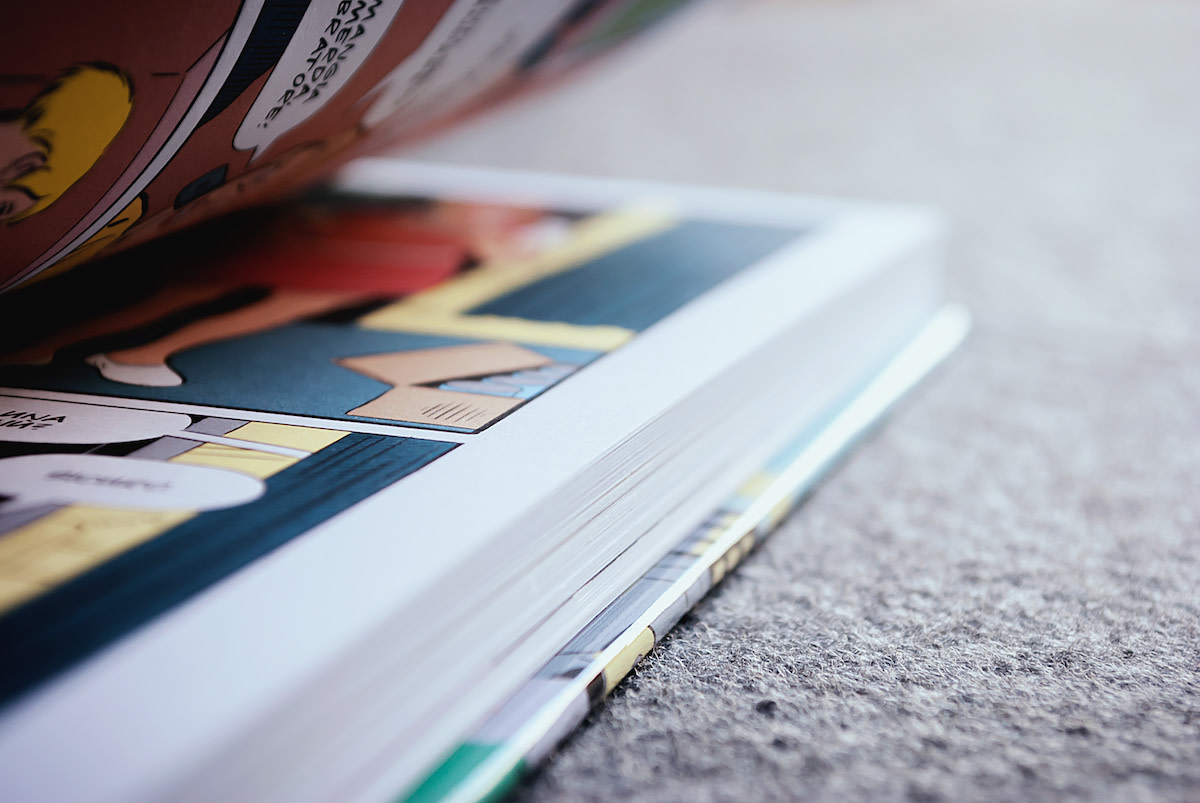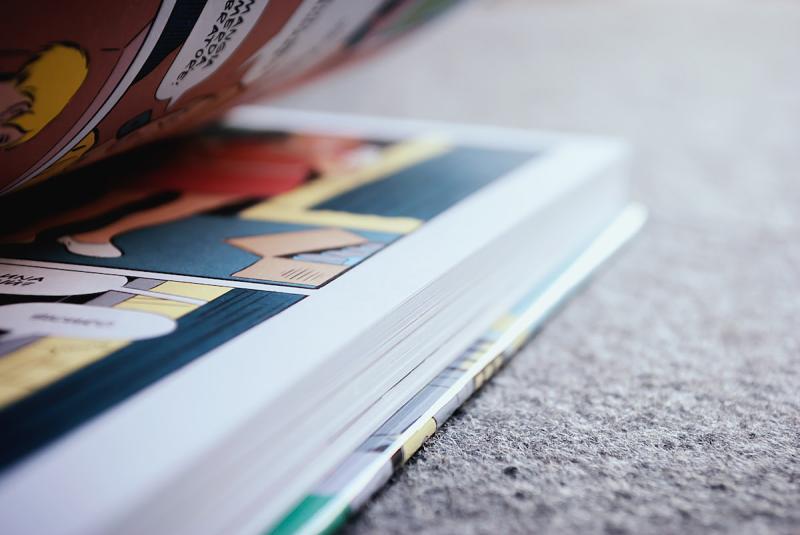Is It a Comic Book or Graphic Novel? Learn the Difference Between Graphic Novels and Comics
By: Master Class

Is It a Comic Book or Graphic Novel? Learn the Difference Between Graphic Novels and Comics
Mixing up comic books and graphic novels can seem like a simple mistake but the terms “graphic novel” and “comic book” are not synonyms. Although both formats feature illustration-based storytelling, they have distinctions that reveal substantive differences.

A graphic novel, as its name suggests, is a novel that tells a complete story via illustrations. A graphic novel contains a beginning, middle, and end. A graphic novel will offer the type of resolution that one expects from a novel, even if it is part of a series. Effectively, this makes a graphic novel longer and more substantive than a comic book, which is a serialized excerpt from a larger narrative.
What Are the Characteristics of a Graphic Novel?
Graphic novels share all the key characteristics of traditional novels. These include:
- A clear beginning, middle, and end
- A central narrative (or A-story) supplemented by optional B-stories
- Character development and personal journeys
- Thematic messaging
- Precise, carefully considered dialogue and narration
The obvious distinction between graphic novels and text-based novels is that graphic novels permit their images to do the vast majority of the storytelling, with dialogue bubbles and narration boxes to help elaborate the story.
7 Classic Graphic Novels
Graphic novels began to gain traction in literary circles in the late twentieth century, and they continue to flourish well into the twenty-first century. Here are some landmark books of the genre:
- 1. Maus by Art Spiegelman
- 2. Watchmen by Alan Moore and Dave Gibbons
- 3. Ghost World and Ice Haven by Daniel Clowes
- 4. Daddy's Girl by Debbie Drechsler
- 5. The Diary of a Teenage Girl by Phoebe Gloeckner
- 6. 100 Bullets by Brian Azzarello and Eduardo Risso
- 7. Locke & Key by Joe Hill and Gabriel Rodriguez
What Is a Comic Book?
A comic book is an excerpt from a larger serialized narrative that is told via illustration. Famous comic book publishers include Archie Comics, Marvel Comics, and DC Comics. From the mid-twentieth century through the present day, these publishers and other similar companies have issued comic books on a weekly or monthly basis in the form of books or as pieces of sequential art called comic strips, which are published in magazines or newspapers. These comics contain excerpts from long-running narratives that can last for years or even decades.
Some of the most famous American comic book series include:
- Superman
- Batman
- The Amazing Spider-Man
- Wonder Woman
- Archie
- The Incredible Hulk
- The X-Men
- The Fantastic Four
- The Sandman
What Is the Difference Between a Graphic Novel and Comic Book?
While an untrained reader may not be able to discern a graphic novel from a comic book, fans of both genres should have no trouble doing so. As a general rule:
- Graphic novels are longer than comic books.
- Graphic novels cover a wide array of genres and subject matters. Comic books may as well, but the subjects are often associated with or explained through the lens of superheroes or heightened realities.
- Graphic novels contain complete narratives, whether or not they are part of a larger series.
- Comic books contain excerpts of serialized narratives. It can be difficult to read a comic book if you haven’t read the comic that comes directly before it in series.
- Both comics and graphic novels can contain complex characters with detailed backstories and inner conflict.
- Comic books are produced with greater frequency than graphic novels, often arriving on a weekly or monthly schedule.
Comic-style illustration is also popular in other countries. For example, Anime and manga, both of which originated in Japan, are popular worldwide. Anime is most analogous to comic books while Manga aligns more closely with graphic novels. Italy is another country who produces comic books, called fumetti , which are translated and exported worldwide.
The Code of Conduct and Terms of Service must be complied with.
Any comment posted about politics or religion not relevant to the seeds/articles that are posted will be deleted.
The administrator reserves the right to delete any comment he considers to be offensive, off topic or of no value.
Videos or images or links to sources that the Administrator cannot open must be described or explained when requested or they will be deleted.






Let's call this just one of a series of learn something new every day - something I never thought about yet something I never really needed to know about, but then at least it's something to keep the "Books" group going.
Some may not think that comic books are books, but then why are they called books? I can't remember what comic books I read when I was a little kid, but I do know that the comic book that did a live-changing thing for me was this one:
Allow me to explain why (although I've done so many times on NT). When I was around 4 years old and in kindergarten during WW2 my mother came to get me at the end of my school day and I was zipping around the playground with the other young kids with my arms outstretched and making buzzing sounds because we were imitating Spitfires. My mother, seeing me do that, and knowing that Teddy Roosevelt's grandson who was in the Air Force was nicknamed "Buzzy" started to call me that, and it caught on with all friends and family. During public school years I hated being called that and only wanted to be known by my real name, but when I got to high school, and the "Buzzy" comic book was popular back then, well, that was it. Not only did I want to be called "Buzzy" by everyone, I even had the name embroidered on my every-day pea jacket. Eventually, though as I got somewhat older, it got shortened to "Buzz" as in "Buzz Aldrin", and it has remained the name that most know me by right up to today.
Anybody else got a comic book or graphic novel story?
When I was a kid I really wasn't into Comic Books. The only ones I read occasionally were The Superman comics, but even those didn't appeal to me much. Probably the first one I liked came later-- MAD Magazine.
Instead I read a lot of books. When younger I loved Winnie The Pooh. Later the Dr. Dolittle series.
Instead I read Science fiction books.
But my true love were Science books (non fiction).
I was much like you when I was a kid. The reason I don't remember much about the comic books I might have read is because I wasn't that much into them, but my mother took me to the public library a lot and there I read the Freddy the Pig books that were written by Walter Brooks. I posted an article on the NT Literary Society group about that a while ago. LINK -> The Forgotten "Freddy The Pig" - Buzz Of The Orient | The NewsTalkers
Then I graduated to sci-fi, reading the pulp magazines my brother bought when I was a pre-teen, and then as I grew a little older more sci-fi novels. Then I read Pride and Prejudice and it steered me towards majoring in English Literature for my Bachelor of Arts degree.
I believe the Comic Book pictured here is from the "Archie and Veronica" series? They didn't particularly appeal to me.
But what I did notice about the one pictured here is something perhaps unusual.I don't remember the series well, but I believe the two figures on the right are Veronica and Archie. They were either dating-- or just friends?
But here's what I found to be interesting. The woman who portrays the "beautiful chick" has dark hair. And the implication that the woman in the green dress (back then they were called "girls" not women) is a blonde.
Early on in the U.S. blondes were considered "Plain Jane's"-- and dark haired women were the "beautiful chicks"). But in recent years its been the opposite!
So what changed? What caused Blondes to suddenly be considered more attractive?
Apparently it was the show "Gentlemen Prefer Blondes"
That's not Archie, it's Buzzy. The blond is Betty, and she was stuck on Buzzy who was stuck on (the dark-haired) Veronica who was stuck on Reggie. Although my first wife was a blonde, I've always preferred dark-haired women, and of course my Chinese wife has black hair.
What about Manga?
Manga is referred to in the last paragraph of the seeded article.